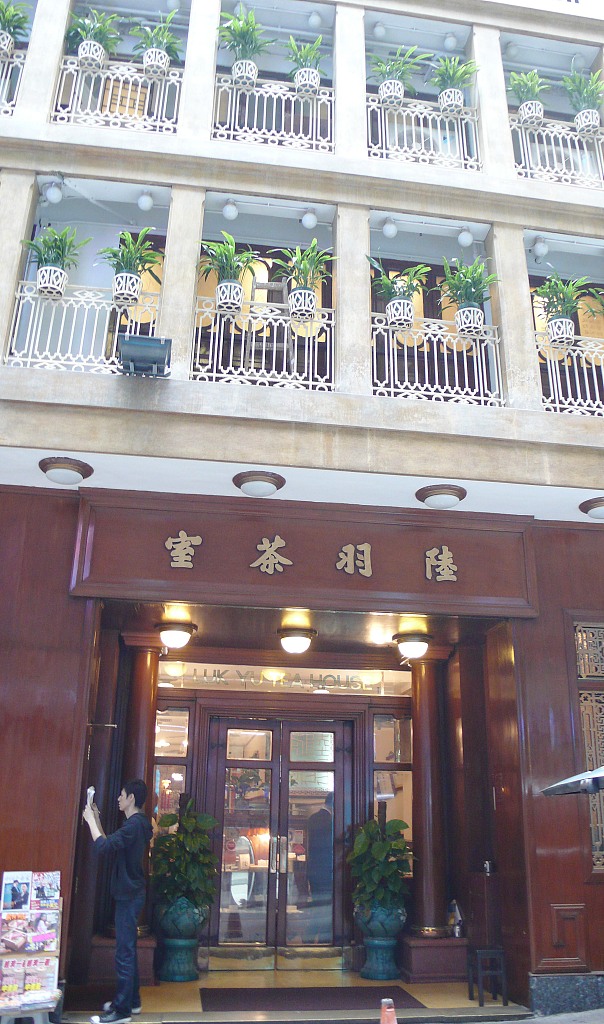
Luk Yu Tea House (Photo: VCG)
Luk Yu Tea House, a long-established tea house with old-fashioned decor in Hong Kong, recently announced that it will put two paintings from its collection up for auction at Sotheby’s Fine Chinese Paintings autumn sale. The two paintings are masterpieces by prodigious Chinese artist Zhang Daqian.
Analysts say that Luk Yu Tea House is selling the paintings because of economic pressure from the downturn in Hong Kong’s tourism industry.
It is indisputable that with the continuous street violence, Hong Kong’s tourism industry is suffering from a pot of "bitter tea." Luk Yu’s Tea House explained that the paintings will be auctioned because of damage from their placement over time and they expect experts will be able to restore them.
However, the tea house admitted that the number of its customers has dropped by about 20 percent recently. Even what has been a valuable "gold brand" cannot be spared from the constant street riots. It reflects what impact the violent chaos is having on Hong Kong’s economy.
As Hong Kong heads into a third month of demonstrations, the city's tourism industry is in pandemonium. Many tourists have canceled their trips to Hong Kong because of the violent protests, which has led to many local restaurants and hotels losing business. Tourist attractions like Ocean Park and Disneyland are also feeling the pinch.
Financial Secretary Paul Chan Mo-po said that Hong Kong visitor arrivals plunged nearly 40 percent in August from a year ago and it has caused the direct economic loss of 12 billion yuan.
On September 8, some radical protesters set fire to the entrance of the MTR Central Station in Hong Kong, which is just blocks away from Luk Yu Tea House.
Video shot during the vandalism at Central Station shows some closed international luxury stores in the background. It is also an indication that if protests are not stopped, business in Hong Kong will not benefit from the Chinese National Day holiday, also known as "Golden Week," celebrated on October 1.
By contrast, business revenue from the tourism, convention and exhibition services domain in Hong Kong increased by 10.1 percent in 2018. Tourism made an important contribution to Hong Kong’s economy last year in the wake of the global slowdown.
Hong Kong’s economy is both developed and fragile at the same time. There is no need to test whether Hong Kong can afford such a mess. It is time to repeat the question: Why does Hong Kong have to continue suffering from the mess?
As Hu Xijin, editor-in-chief of the Global Times, said, at present, the Hong Kong community needs to have a collective emotional quotient. Having an emotional quotient means not lifting a rock to smash your own feet; to be collective means that it is a consensus.
All Hong Kong residents will have to "pay the bill" together, no matter whether the loss is in the short, medium or long-term.
Vandalizing the legislative building and tearing down smart lampposts will end up costing Hong Kong taxpayers more. In the short-term, the damaged tourism industry will have a bearing on about 250,000 jobs within the industry and many other related positions.
In the medium-term, the aftermath of violent protests will take a toll on the other pillars of Hong Kong’s economy such as the trade and financial industries.
In the long-term, a turbulent society and a stagnant economy will eventually rob young people of their jobs, making them the hardest hit victims. However, those who incite young people to be the vanguard during the riots will not be spared any sympathy.
With the strong support of the Chinese central government, Hong Kong successfully survived the Asian financial turmoil in 1998 and the global financial crisis in 2008. The external risks are not scary. The most serious is to destroy your own Great Wall.
We criticize Fitch's downgrade of Hong Kong for being based on insufficient guidelines. We even suspect that Fitch cooperates with international speculators to take advantage of Hong Kong's financial market.
However, if the riots continue and the situation does not stabilize, the price for Hong Kong will be far greater than simply preventing others from commenting.
Over the past 3 months, many Hong Kong residents have experienced the terrible outcome of the protests. Maybe those sufferings can be a wake-up-call for others who still cling to a pipedream.
(Compiled by Ryan Yaoran Yu and Elaine Yue Lin.)


